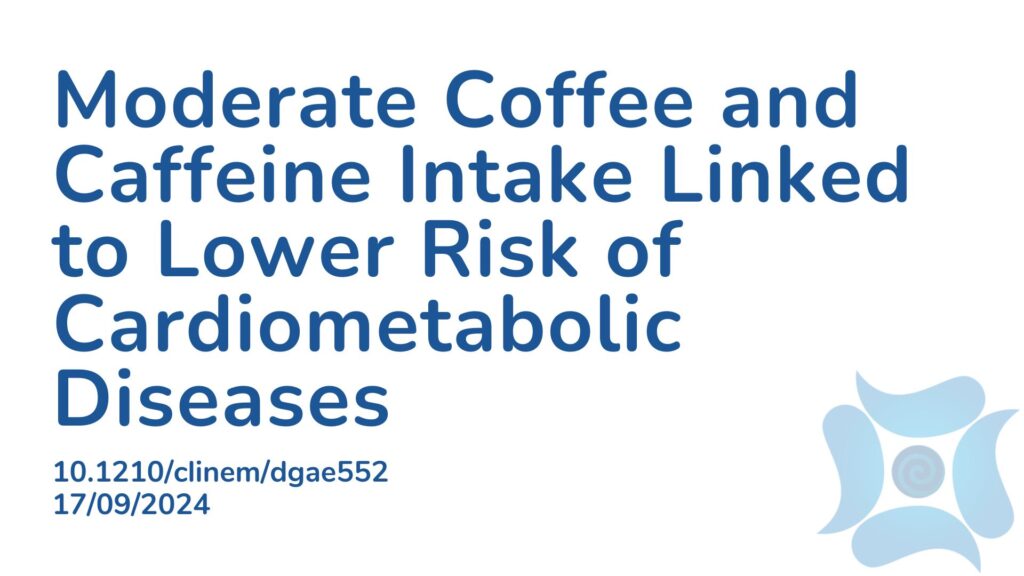Summary:
Cardiometabolic multimorbidity (CM), which refers to the coexistence of conditions like type 2 diabetes, coronary heart disease, and stroke, is an increasing public health issue as both the population and its prevalence grow. While previous studies have suggested that coffee, tea, and caffeine intake may have positive impacts on individual cardiometabolic diseases due to their antioxidant properties, their relationship with multimorbidity remains unclear. This prospective study analyzed data from the UK Biobank, including 172,315 participants for caffeine intake analysis and 188,091 participants for coffee and tea intake analysis, all free of cardiometabolic diseases at baseline. CM was defined as the presence of at least two of the following conditions: type 2 diabetes, coronary heart disease, or stroke. The results showed an inverse relationship between coffee, tea, and caffeine intake and the risk of developing CM, meaning that as the intake of coffee, tea, and caffeine increased, the risk of CM decreased. Participants who consumed moderate amounts of coffee (around 3 cups per day) or caffeine (200–300 mg/day) had the lowest risk of new-onset CM. Moderate coffee or caffeine consumption was linked to reduced risks at nearly all stages of CM development. The study also identified specific circulating metabolites associated with coffee and caffeine intake. These metabolites play key roles in metabolic processes that influence cardiometabolic health, such as lipid components involved in cholesterol transport. Their molecules positively contribute to energy metabolism, and their regulation could help lower the risk of heart disease and other metabolic conditions. Histidine, an amino acid, also has anti-inflammatory properties and may contribute to improved metabolic health, reducing the likelihood of developing conditions like type 2 diabetes and cardiovascular disease. Overall, the study suggests that coffee, tea, and caffeine intake positively affects metabolic pathways by helping to regulate lipids, inflammation, and energy metabolism, which, in turn, lowers the risk of developing cardiometabolic diseases like type 2 diabetes, coronary heart disease, and stroke.
Abstract:
Cardiometabolic multimorbidity (CM) is an increasing public health concern. Previous observational studies have suggested inverse associations between coffee, tea, and caffeine intake and risks of individual cardiometabolic diseases; however, their associations with CM and related biological markers are unknown. Methods: This prospective study involved 172 315 (for caffeine analysis) and 188 091 (tea and coffee analysis) participants free of any cardiometabolic diseases at baseline from the UK Biobank; 168 metabolites were measured among 88 204 and 96 393 participants. CM was defined as the coexistence of at least 2 of the following conditions: type 2 diabetes, coronary heart disease, and stroke. Results: Nonlinear inverse associations of coffee, tea, and caffeine intake with the risk of new-onset CM were observed. Compared with nonconsumers or consumers of less than 100 mg caffeine per day, consumers of moderate amount of coffee (3 drinks/d) or caffeine (200-300 mg/d) had the lowest risk for new-onset CM, with respective hazard ratios (95% CIs) of 0.519 (0.417-0.647) and 0.593 (0.499-0.704). Multistate models revealed that moderate coffee or caffeine intake was inversely associated with risks of almost all developmental stages of CM, including transitions from a disease-free state to single cardiometabolic diseases and subsequently to CM. A total of 80 to 97 metabolites, such as lipid components within very low-density lipoprotein, histidine, and glycoprotein acetyls, were identified to be associated with both coffee, tea, or caffeine intake and incident CM. Conclusion: Habitual coffee or caffeine intake, especially at a moderate level, was associated with a lower risk of new-onset CM and could play important roles in almost all transition phases of CM development. Future studies are warranted to validate the implicated metabolic biomarkers underlying the relation between coffee, tea, and caffeine intake and CM.
Article Publication Date: 17/09/2024
DOI: 10.1210/clinem/dgae552



